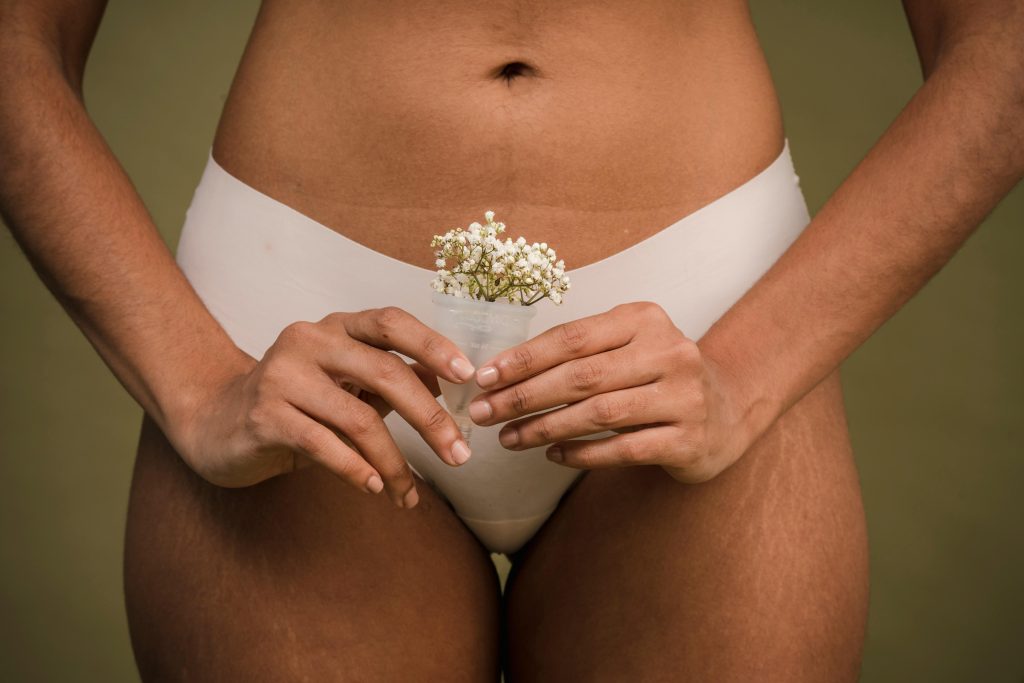A woman has an average of 451 periods in her life and uses about 11,000 tampons and/or pads during her lifetime. This means that the products you choose for your period can have a significant impact on your health and the environment. In this blog, I will explain the dangers of toxic substances in traditional menstrual products and give you some healthy and sustainable alternatives.
A very permeable space
The vagina is a very permeable space, which means that everything we put into it is absorbed through the mucous membrane and then goes directly into our bloodstream. This makes it extra important to pay close attention to the ingredients of the products we use during our period.
The Dangers of Traditional Tampons and Pads
Conventional Tampons
Conventional tampons are often made from a blend of synthetic rayon and cotton.
- Rayon: When rayon is bleached, it releases a byproduct called dioxin. The International Agency for Research on Cancer (IARC) has determined that there is no safe level of exposure to dioxin. Dioxin has been linked to cervical cancer, breast cancer, endometriosis, and immune system suppression.
- Cotton: Cotton is one of the most heavily sprayed crops. More than 90% of all cotton is sprayed with glyphosate. Glyphosate is associated with neurological diseases, endocrine disruption, autoimmune diseases, chronic fatigue syndrome, osteoarthritis, fatty liver disease, kidney failure, insulin resistance, diabetes, and cancer.
Conventional tampons also contain odor neutralizers, fragrances, and dyes that can contain a variety of other toxins.
Sanitary towel
The ingredients in sanitary napkins are often not much better. They contain similar toxic substances to tampons, including chemicals that can cause skin irritations, allergies, and more serious health problems.
Good news!
Fortunately, there are much safer and more eco-friendly options available that protect your health and reduce the impact on the environment.
Healthy and sustainable alternatives
Menstrual cups
Menstrual cups are small, flexible cups made of medical silicone, rubber, or TPE (thermoplastic elastomer) that are inserted into the vagina to collect menstrual blood. They are reusable, which means that they can be cleaned and reused after each menstrual cycle.
Advantages:
- Made from medical grade silicone with no harmful chemicals.
- Reusable, which reduces waste.
- Can be worn for up to 12 hours without leaking.
Disadvantages:
- Requires some practice to insert and remove.
- Can be more expensive on the first purchase but saves in the long run.
Organic cotton tampons and pads
Organic cotton tampons and pads are made from 100% organic cotton grown without pesticides or herbicides. They are unbleached or bleached without the use of chlorine, which makes them free of dioxins and other harmful substances.
Advantages:
- Free from harmful chemicals and pesticides.
- Biodegradable and compostable.
- Available in different shapes and sizes to suit different needs.
Disadvantages:
- Still a disposable product, which generates waste.
- Can be more expensive than conventional options.
Washable Sanitary Pads
Washable pads are made from natural fabrics such as cotton, bamboo, or hemp. They can be washed and reused after use, which makes them a sustainable alternative to disposable pads.
Advantages:
- Made of natural and breathable materials.
- Reusable, which reduces waste.
- Available in different sizes and absorption levels.
Disadvantages:
- Requires regular washing and maintenance.
- Can be more expensive at first but saves in the long run.
Menstrual underwear
Menstrual underwear is specially designed underwear with built-in absorption layers that collect menstrual blood. It can be worn in the same way as normal underwear and then washed and reused.
Advantages:
- Easy to use and comfortable.
- Reusable, which reduces waste.
- Available in a variety of styles and absorption levels.
Disadvantages:
- Requires regular washing and maintenance.
- Can be more expensive to buy but save in the long run.
You can buy the most beautiful and finest menstrual underwear here with a nice discount. Use discount code GLOW15.
Conclusion
It’s clear that traditional menstrual products can contain potentially harmful chemicals that harm both health and the environment. Fortunately, there are many healthy and sustainable alternatives available today. By choosing menstrual cups, organic cotton tampons and pads, washable pads, and period underwear, you can reduce exposure to toxic substances while contributing to a more sustainable future.
When choosing menstrual products, it’s important to think not only about comfort and convenience, but also about the impact on our health and the environment. By making conscious choices, we can make a positive change in our own lives and the world around us.
Citation:
- https://www.ncbi.nlm.nih.gov/pmc/articles/PMC2898056/#b2-ijerph-07-02395
- IARC Monographs on the Evaluation of Carcinogenic Risks to HumansPolychlorinated Dibenzo-para-Dioxins and Polychlorinated Dibenzofurans; International Agency for Research on Cancer (IARC): Lyon, France, February 1997; Volume 69
- https://pubmed.ncbi.nlm.nih.gov/37743685/#:~:text=Conclusion%3A%20Menstrual%20products%20contained%20measurable,can%20impact%20women’s%20reproductive%20health.
- https://www.wecf.org/nl/wp-content/uploads/2020/05/gifvrijongesteld.pdf
